7 advantages of senior care at home
Specialist topics
7 advantages of senior care at home
Are you also in a situation where one of your relatives needs help with everyday life? A person's needs change as they get older. It may be the case that you are no longer able to provide care for the elderly on your own. You are then faced with an important decision: What type of care is right for your relative?
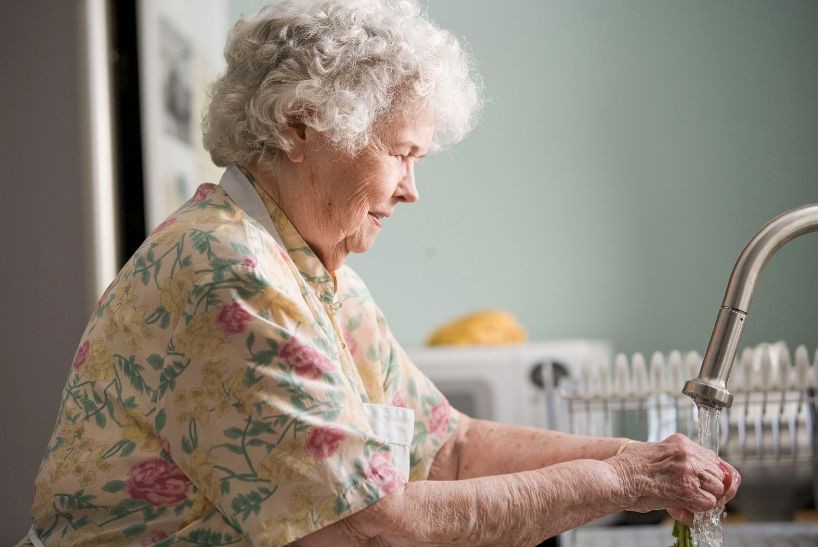
If you are unable to provide them with all the help they need yourself, it's time for elderly care. However, this does not necessarily require your relative to move into an inpatient organization. There is the option of senior care at home and this offers numerous advantages.
Constant medical advances mean that more and more people are enjoying longer lives. They often retain their mobility into old age and want to maintain their freedom as far as possible. Home care for the elderly is a good solution for precisely this group of people.
Your relative will receive professional support in the areas in which they need it, while remaining in their familiar surroundings. The possible services include
- Support in coping with everyday life
- Accompaniment to visits to the doctor Help with personal hygiene
- Dosing and administering medication
- Blood pressure measurement, blood sugar measurement, wound care, etc.
Thanks to home care for the elderly, your relative can maintain their usual daily routine and continue to participate in their familiar social life. Despite remaining in their own four walls, they are optimally cared for in every respect.
7 Gründe, die für eine Seniorenbetreuung zu Hause sprechen
1. unrestricted freedom
One point that worries many people is that they are afraid their relative will feel like they are being deported. They feel patronized and that many of their freedoms would be taken away. But thanks to care for the elderly in their own four walls, this is not the case. The thought of having to move into a care home will probably not only make you feel uncomfortable, but also your relative.
If a carer visits them regularly at home, it means that they can continue to take control of their own lives. After all, they are not in his immediate vicinity all day. Should an emergency arise, a carer is of course still available at all times and can be on site as quickly as possible.
It is not uncommon for residential care facilities for the elderly to be seen as a "last resort". The mere thought of it is off-putting. This is sometimes based on a fear of ageing that haunts many people. Increasing age is often associated with negative aspects such as loss of mobility and a deterioration in health. However, thanks to major medical advances, this is not necessarily the case.
Fear of death can also play a role. Every human being carries this fear within them for evolutionary reasons, and for good reason. It regulates our own actions and prevents us from taking major risks, so it is something completely natural.
So if an inpatient facility for the elderly is actually seen as a kind of last step, this creates an uneasy feeling. There is a widespread desire to enjoy one's old age as fully as possible without being bound by the rules of an inpatient facility.
2. not leaving the household behind
A familiar environment is particularly valuable for older people. This is especially true if they have not changed their home for many decades. Thanks to the option of senior care at home, your relative will not be torn from their familiar surroundings.
Moving out often feels like leaving your previous life behind. It places a heavy burden on the psyche if you are not emotionally ready for it. It is also not always possible to take all the things that are of great emotional value to your relative with you. They may have to part with a few mementos.
People like to reminisce about the "good old days". Memories shape a person well into old age. They have made them who they are today. These memories are often linked to objects or even entire living spaces. These kinds of supports are particularly important in old age. This is especially true when memory begins to fade.
There is often a great fear of simply forgetting formative moments in life. Those who remain in their familiar surroundings do not have to part with anything that evokes precious memories and simply makes them happy.
What is the importance of remaining in one's own home when it comes to dementia care for the elderly?
It is particularly important for people with dementia to retain familiar things as far as possible. Is your relative still at a stage of the disease where they can cope well on their own at times? Then rely on care at home.
Too many new impressions could overwhelm them. However, if he sees the surroundings he was used to before his illness every day, this can bring back old, positive memories. Their sense of well-being is significantly increased.
The illness makes it very difficult for them to adapt to new situations. Leaving their familiar surroundings can have a negative impact on their mental health. It is not uncommon for people with dementia to fear losing control as soon as something changes.
The temptation to flee the inpatient facility and return to their old home is great for some sufferers. This kind of discomfort doesn't help anyone.
What are the advantages of senior care at home in terms of privacy?

Everyone has a need for privacy. This does not necessarily mean that you have something to hide. But the feeling of being constantly watched often causes discomfort. Everyone needs a protected area where they can move and speak freely. No one needs to be afraid of being judged there.
Anyone who constantly fears that everything they do and say could be seen or heard by someone changes their behavior. This fact has even been scientifically proven. People who believe they are under observation generally act in a pleasing manner because they want to meet the expectations of the observer. These expectations often count more than your own wishes.
3. Maintain everyday life as far as possible
Not only the surroundings, but also the familiar daily routine remains the same thanks to home care for the elderly. Together with your relative and the caregiver, you discuss in advance exactly what the care will look like.
This gives you the opportunity to schedule the caregiver's visits so that they fit in perfectly with your everyday life. This means they won't be too much of a change. Your relative will continue to live according to their habits, but with a few adjustments. They will help him to cope better with everyday life and maintain his health.
Rituals are particularly important and even increase physical and mental well-being. They bring structure to everyday life, which in turn provides security. Fixed structures are particularly important in old age. They help people to maintain a regular daily routine and not lose their bearings in the complexity of everyday life.
Those who stick to routines that take place in the same way every day are not doing so as a kind of compulsion. It is simply a familiar routine that maintains your comfort zone. It gives you strength and confidence. Habits create a sense of security and give you the feeling that you have everything under control.
Anyone who has been going about their daily routine in the same way for decades will find it difficult to suddenly give it all up. The more entangled you are in old habits, the more difficult it will be to adjust to a new environment with new daily routines. It is not uncommon for senior citizens to ask themselves questions such as: "What if this new daily routine doesn't work for me at all?"
Every person is individual
This also applies to personal ideas about the perfect daily routine. Anyone who suddenly has to give up their habits may feel deprived of parts of their personality as well as their independence. With senior care at home, a high degree of independence is retained. This is not always the case in an inpatient facility.
Tasks that your relative can actually still manage themselves may still be taken away from them. On the other hand, the mere knowledge that there is always specialist staff on site to take over tasks on request can tempt people to take advantage of this. Independence is then lost step by step. Yet it is precisely this point that is often associated with "ageing with dignity".
4. maintaining familiar social contacts at will
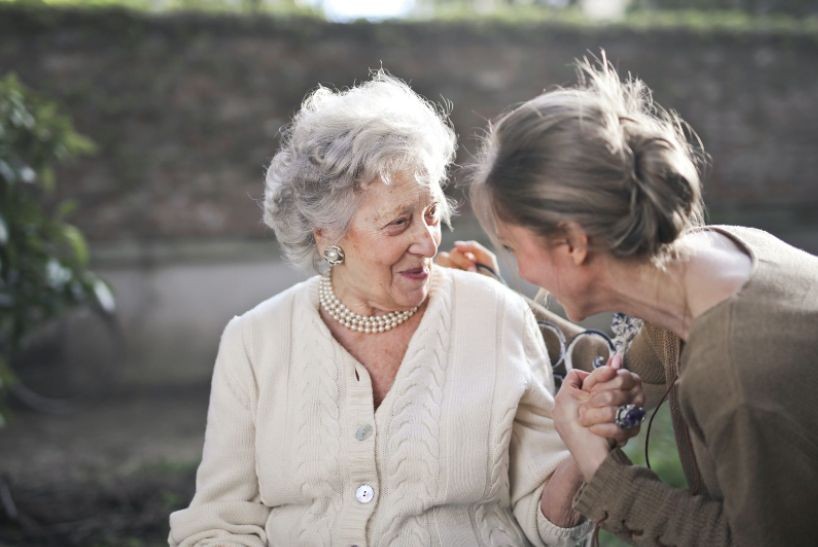
An important aspect is the contact with family and friends. If you opt for senior care at home, your relative can receive visitors at any time and without restrictions. A constant social environment is very important at any age.
Is your relative simply no longer interested in making new acquaintances or even making friends? Then it may be difficult to establish social contacts in an inpatient organization. In addition, he may come into permanent contact with some of the more severely dependent patients. This may give rise to the fear that they could soon suffer the same fate.
Social contact makes a valuable contribution to maintaining physical and mental health, as numerous studies have shown. If your relative becomes increasingly isolated, this may lead to loneliness, which in turn may lead to depression. However, it is in your interest to make their retirement as enjoyable as possible and prevent this from happening.
It is human nature not to live in solitude, as a glance at history shows. Even before settling down, people at that time mainly traveled in groups and secured their well-being together. Close contact with family and good friends also simply makes people happy. In the context of senior care at home, meetings are more frequent and more flexible.
Why social contacts are so important in old age
In addition to calendar, biological and perceived age, there is also social age. As the name suggests, it is influenced by the social environment. The entire ageing process therefore also depends on how closely networked you are and how intensively you maintain contacts.
This also influences the perceived age. The more active your social life is, the more comfortable and young-at-heart most people feel. However, the number of social contacts often decreases with increasing age. This makes it all the more important to maintain the remaining ones, as positive social contacts can even have a life-prolonging effect according to scientific research.
They ensure satisfaction and convey the feeling of always being able to receive support when it is needed. This in turn can contribute to better stress management and reduce the risk of developing depression in old age.
In addition, people who are socially active lose cognitive abilities more slowly and recover more quickly after illness. The German psychologist and gerontologist Hans-Werner Wahl adds further benefits to this list, such as
- Promoting creativity
- Maintaining independence
- Open-minded interaction through regular interaction with other people
How contacts can prolong life

Social contacts and the associated regular interaction with others challenge our mental performance. They keep the brain fit and can reduce negative stress, which in turn can have a negative impact on health. Not only the contact itself, but also joint activities have positive effects. They ensure that your relative remains active and mobile.
However, it is not the number of social contacts that is decisive, but the quality of each one. Countless acquaintances that do not result in close relationships are not the key to happiness. It is important that your relative can confide in their friends and feels understood by them. This is often not the case with casual acquaintances.
At best, there are intergenerational contacts. Friendships with younger people always bring with them new, positive challenges and provide more foresight. People who move into an inpatient facility are mainly surrounded by their peers, and these new challenges are missing.
And don't forget the fact that your relative will probably come into contact with people who are increasingly in need of care. Fears can quickly arise that they will soon feel the same way. Instead of stirring up fears, positive experiences should dominate everyday life to maintain the joy of living into old age. Spending time with friends plays an important role in this.
There is no magic number that determines how many friendships are ideal. The important thing is that your relative feels good about it. If he likes to be surrounded by lots of people, then numerous contacts will do him good.
If the opposite is the case, then a few close contacts are just right. The focus is on your own well-being. Social interactions should not be associated with stress and pressure, but with pleasure.
5. exactly the support that is needed
With outpatient senior care, you can provide your relative with particularly personalized help. Together, you decide exactly when the caregiver will visit and what services they will provide. If your relative's needs change, the care will be expanded or adapted accordingly.
The decision as to when and in what form support is required is therefore entirely up to you and your relative. Changes can also be made at short notice if more help is needed than usual.
This may be the case, for example, if you take on certain tasks yourself but are temporarily unable to do so for work reasons. Your relative can still remain in their own household and decide for themselves how they want to organize their everyday life.
If your relative is able to take over certain tasks themselves again, an adjustment to this effect is also possible immediately. This will be relevant, for example, if they have overcome an illness that previously prevented them from doing certain things.
One of the aims of care is to promote your relative's independence. This also includes allowing them to take over tasks themselves again as soon as they are able to do so. Of course, the Spitex specialist will check beforehand whether this is actually possible or whether it would be premature to forego the corresponding service.
Competent nursing staff also keep a constant record of your relative's state of health and the measures taken. If you wish, you can view these notes digitally at any time and can of course also be present during the visits. This gives you full control.
You can intervene immediately if you are dissatisfied at any point. The same applies if you suspect that your relative's needs may have changed. The Spitex specialist will then check the situation more closely.
The home care specialist as a caregiver
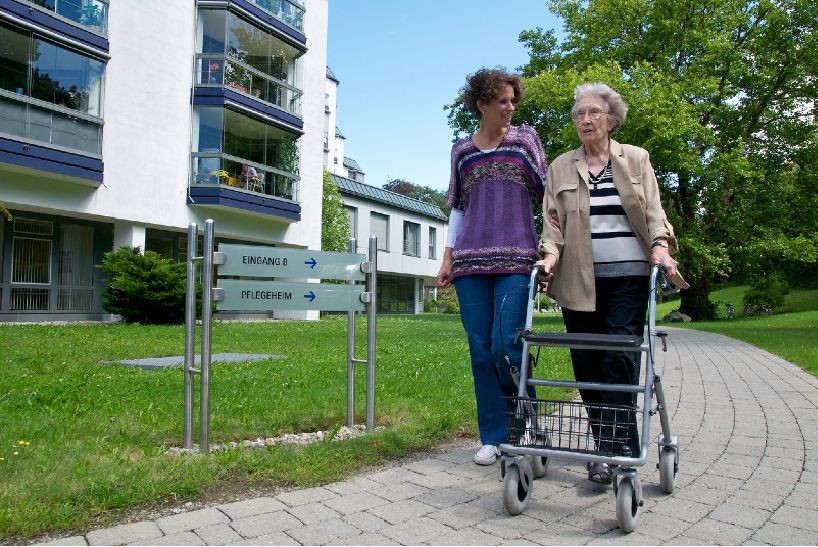
You have the opportunity to regularly check that your relative's needs are being met. Does your relative feel uncomfortable in the presence of the caregiver because the chemistry is simply not right? Then you have the option of asking for another member of staff.
It is difficult to predict at the first meeting whether your relative will get on well with the Spitex specialist or not. Only time will tell. If problems do arise, it is important to take action. Address any criticisms openly, as this is the only way to resolve them.
If in doubt, you can check whether another specialist is available to look after your relative from now on. In an inpatient organization, this is rather difficult or simply not possible. Of course, the welfare of the client is also the priority there. However, in the context of outpatient care, it is often easier to respond to each person individually.
Don't forget that the carer spends a lot of time with your relative. If they don't feel comfortable and don't want to open up to them, communication will be difficult. Your relative should definitely talk openly about how they are feeling and what they need help with. This is the only way to optimize care.
Ideally, the caregiver will quickly develop into a personal caregiver in the context of home care for the elderly. The more familiar the relationship between your relative and the professional is, the more freely they will talk about their concerns. This also has a positive effect on the psyche. Visits from the home care specialist should never cause stress or discomfort.
6. flexible allocation of care
You also have the option of sharing the care of your relative with the caregiver if you wish. Certain tasks that you are unable to take on due to time constraints or simply a lack of specialist knowledge, such as medical matters, can be carried out by the caregiver.
Your relative may not want to have intimate matters such as personal hygiene carried out by someone else. In this case, you can step in again. An inpatient organization does not offer you this flexibility.
Sharing tasks with the specialist staff is a huge relief for you as a family caregiver. Even if you are unable to devote the necessary time yourself, your relative will be well looked after.
7. lower costs compared to stationary organizations
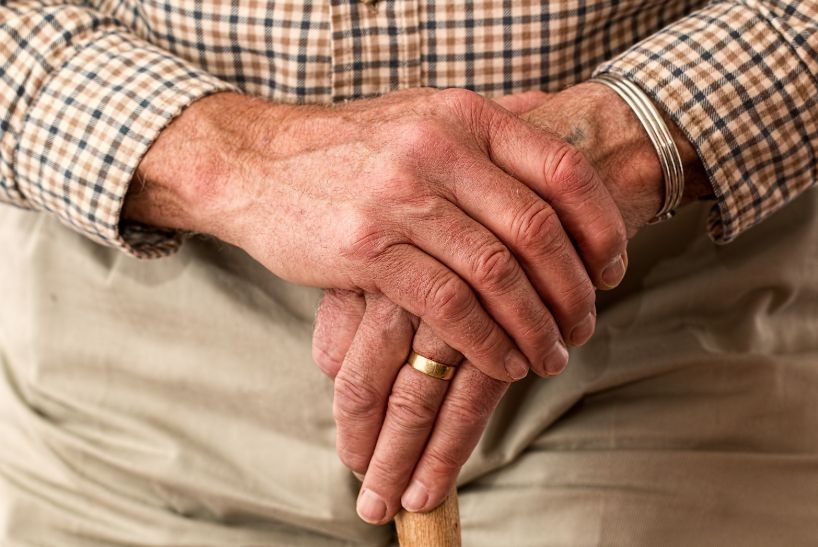
There is also the financial aspect. Senior care within your own four walls is often cheaper than accommodation in an inpatient care home. In addition to the deductible that your relative already pays and the excess, he or she pays 10% of the care costs incurred.
The remaining 90 % is financed by the health insurance company with which they are insured. In addition, there is the client contribution, which varies from canton to canton. However, the maximum amount is CHF 15.95 per day of care. Check whether your relative has supplementary insurance.
If so, they may be able to have some or all of the costs incurred for household help covered. Do you still need help paying for care for the elderly? This does not mean that your relative has to manage alone.
Everyone has the right to receive care if necessary, regardless of how much money they have at their disposal. One option is to take out the supplementary insurance mentioned above. Many health insurance companies offer this.
Simply ask about it and compare different offers if necessary. When you take out the policy, set a maximum number of hours that your relative's insurance will cover. If they need more hours, you will have to pay for them from your own funds.
There is also the helplessness allowance, which your relative may be able to claim. This compensation may apply, for example, if they are no longer able to get out of bed on their own. They may also be entitled if they are unable to perform personal hygiene or eat independently. The amount of the payment ultimately depends on how advanced the helplessness is.
How to find the best Spitex for your relative

Have you opted for senior care at home? Then the next question is: which Spitex is the right one for your relative? There are numerous organizations and the search process takes a lot of time. We at OPAN® take on this task and help you to find the right Spitex.
How does OPAN® work?
We connect you with numerous non-profit and private organizations in your area. All you need to do is enter your relative's zip code and off you go. No additional software is required to use OPAN®.
To ensure that the health insurance company will approve the costs, it is advantageous if you inform your family doctor in advance about the planned care so that he or she is aware of the subsequent steps.
The system will now show you any Spitex organizations clearly and you have the choice. Take your time to look at all the organizations and get a comprehensive picture of them.
Once you have made your decision, you will need to enter a few personal details. This includes the name of the client, the health insurance company and the treating doctor. If you have any useful medical reports or documents, you can attach them electronically.
Spitex then processes the data as quickly as possible. Data can be transferred at any time, even outside Spitex business hours. It doesn't matter whether you do this yourself or the doctor. It goes without saying that all information is transmitted in encrypted form, as data protection is our top priority.
You will receive notification of the current status of your registration by e-mail. Within a few days, a representative of the chosen Spitex will contact you and discuss the next steps with you.
The next step is the so-called needs assessment. Spitex will check which services your relative urgently needs and send the results to their doctor. The doctor will also check the assessment again and then forward everything to the health insurance company. Only then will the insurance company cover the costs of the specified services. The client usually finances everything else themselves.
Optimum support in just a few steps
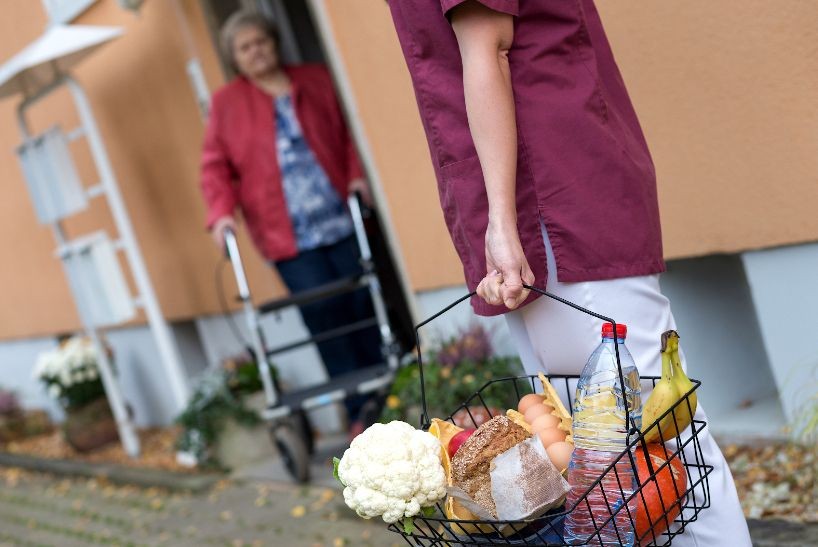
When it comes to providing your relative with the help they need, care is required. After all, you always want them to be in good hands. At OPAN®, we make sure that they get exactly that help. It doesn't matter whether it's just a little help with the shopping or whether they need medical or psychological care.
Spitex takes care of your relative's well-being as part of the home care for the elderly. All it takes is a few clicks to register. OPAN® is available around the clock. We look forward to hearing from you by phone or e-mail.
